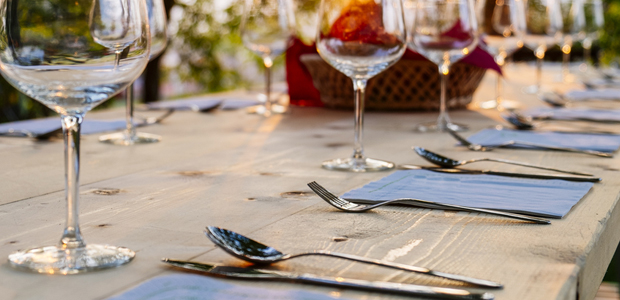Advertisement
Kitchen Corner: Dos and Don’ts for Specialized Diets
Having folks over for dinner is a fantastic way to show off your culinary prowess, and occasionally put yourself under a ton of unnecessary pressure to impress people who already know and like you (or is that just me?). Throw in a seemingly ever-expanding set of diets, lifestyle choices, intolerances, allergies, and the occasional fad, … Continued

Having folks over for dinner is a fantastic way to show off your culinary prowess, and occasionally put yourself under a ton of unnecessary pressure to impress people who already know and like you (or is that just me?). Throw in a seemingly ever-expanding set of diets, lifestyle choices, intolerances, allergies, and the occasional fad, and before you know it, you’ve ended up in a hyperventilation situation.
Luckily, we’re thoughtful enough to give you a quick and handy rundown of some of the top dietary requirements. This way you’ll know at glance what everyone can eat, and you’ll save yourself some worry lines.
Vegetarian
Probably the easiest one to grasp: “No food with a face,” to quote a certain Friends veggie. Vegetarian diets exclude all meat, poultry, and seafood. Some vegetarians (technically ovovegetarians) will eat eggs but no dairy, while others (lactovegetarians) will eat dairy but not eggs. It is definitely best to check with your guests before planning a meal.
Pescatarian
In this case, a vegetarian diet is followed, with the exception of fish.
Vegan
In addition to following a vegetarian diet, vegans also eschew all animal byproducts. This includes eliminating eggs, dairy, gelatin, and honey from their diets and not using other day-to-day items that are derived from animal products, such as wool, silk, and leather, as well as some cosmetics, soaps, and alcoholic beverages.
Paleo
The paleo regime is also sometimes called the caveman/primal/stone age diet. Basically, this regime is high in protein and fibre and cuts out all processed foods. Mainly, paleo followers are able to eat lean meat and fish, fruit, vegetables, and healthy fats. They are also permitted to consume eggs, nuts, seeds, and healthy oils like coconut and olive oil. As well as a ban on processed foods, the paleo diet bans salt, dairy, refined sugar, potatoes, grains, and legumes.
Gluten-free (celiac)
A purely gluten-free diet is essential for sufferers of celiac disease to control their symptoms and prevent further health complications. Celiac sufferers need to avoid gluten in all its forms. This doesn’t just mean the flour in bread, pastas, and sauces. Wheat, barley, and rye should be avoided altogether, along with anything containing ingredients labelled:
- triticum vulgare
- triticum spelta
- triticale
- hordeum vulgare
- secale cereale
It is also crucial to avoid potentially contaminated products that could have been in contact with gluten. Typically, this consists of other grains, nuts, and starches, so you should take care that “gluten-free” is stated before deeming something safe to use. There is a full rundown of what to avoid and how to avoid it here.
Many people now choose to eat gluten-free, but do not suffer from celiac disease. In these cases, they will likely not be affected by cross-contaminated foods and minute amounts of gluten found elsewhere. Double check your guests’ reasoning for going gluten-free before deciding on a menu.
Are you currently following one of these diets? Check our handy supplement guide for a list of common deficiency symptoms and how to fix them by boosting your nutrients.





